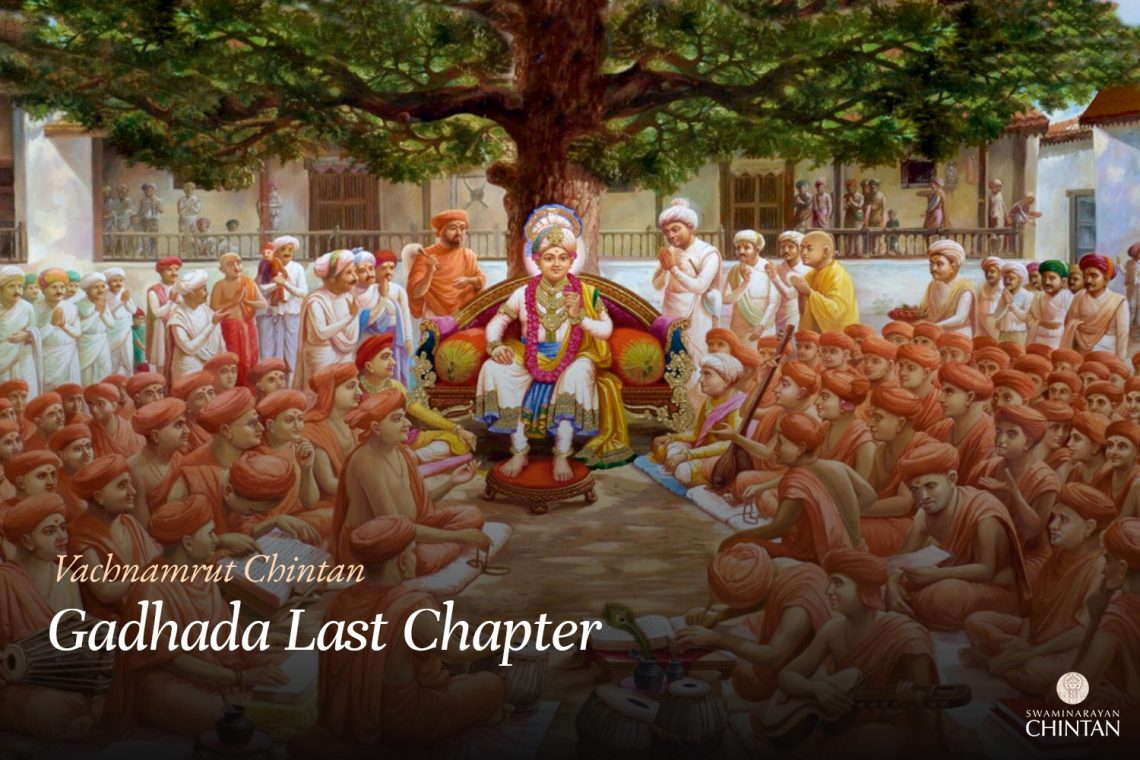Central Insights:
- Means to Eradicate Vasana (desires) and Whether the Greatness of God Eliminates or Increases Sin
Key Points:
- Without austerities (tapascharya), devotion alone cannot quickly eradicate vasana.
- If the recognition of greatness (mahima) is not coupled with pure intentions, sin increases in life.
Explanation:
In this Vachanamrut, Shreeji Maharaj posed the question: “Will you explain the verse of the Gita, विषया विनिवर्तन्ते निराहारस्य देहिनः — viṣayā vinivartante nirāhārasya dehinaḥ, When the saints provided explanations based on Ramanujacharya’s commentary, Maharaj expressed His own unique understanding:
“I have determined thus.”
Here, Maharaj offers an independent perspective, shedding light on subtleties overlooked by ordinary scholars and even by some Acharyas. With simplicity and humility, He elucidates concepts that otherwise remain obscure:
“I have determined thus.”
This statement also highlights Maharaj’s originality in interpreting scriptures.
Maharaj states that a person in their youth should reduce food intake and maintain balance in their habits. Two key points emerge from this guidance:
- Austerities (tapascharya): Reducing food consumption, which is itself a form of rigorous austerity.
- Devotion (bhakti): Performing the nine types of devotion with genuine love and interest. True devotion is heartfelt and sincere.
When one abandons sense objects (viṣayā), the external engagement with them may cease, but their vasana—deep-seated desires—does not dissipate instantly. Maharaj elaborates that fasting or external control over food may address the gross sense objects but does not eliminate vasana. On the contrary, the absence of external indulgence can intensify the longing for those objects.
The question arises: How can vasana be eradicated? Maharaj explains, “param dṛṣṭvā nivartate—by worshiping the supreme God, vasana is removed.” Worship and devotion (upasana) directed towards the supreme ultimately dispel desires.
One might analyze whether vasana is better eradicated by austerities or devotion. At first glance, austerities seem to strike at the root of vasana. However, history reveals otherwise. Saints like Saubhari, Parashar, and Vishwamitra performed intense austerities yet failed to uproot their vasana. Conversely, devotees such as the gopis, Meera, and Ambarish, who were not known for extreme austerities, successfully eradicated their vasana through devotion.
This leads to a deeper question: Does devotion invariably eradicate vasana or can it sometimes exacerbate it? The path of devotion can be slippery, with opportunities for indulgence. If intense austerities do not accompany devotion, it may not eradicate vasana but rather strengthen it.
As Maharaj mentions in Vachanamrut Gadhada Middle Chapter 3: “On the path of indulgence, countless souls have stumbled. Many have been ruined, and only a few have benefited.” Thus, austerities purify devotion and render it effective in uprooting vasana. However, austerities alone are insufficient and may lead to arrogance without devotion to God.
In conclusion, austerities must complement devotion for it to become potent enough to eradicate vasana. As stated in the Gita, , रसवर्णं रसोऽप्यस्य परं दृष्ट्वा निवर्तते — rasavarjaṁ raso’py asya paraṁ dṛṣṭvā nivartate when one develops attachment to God, the roots of desires are severed. Maharaj asserts that if one moderates their diet and loves God sincerely, their path through holy fellowship (satsang) becomes successful. Without such devotion, even a trance-like devotee like Govardhan is vulnerable, let alone ordinary individuals.
In the second part of this Vachanamrut, Maharaj explains the conduct of a true devotee who understands the greatness of God. Such a devotee observes the moral boundaries (dharma-maryada) set by God with unwavering adherence. The recognition of God’s greatness serves as a guiding force in adhering to these moral boundaries.
Conversely, individuals with distorted intelligence misuse this understanding of God’s greatness. They argue: “Such a great God is the redeemer of sinners. If I act contrary to dharma, why should I worry? God will save me regardless.” Such reasoning leads them to commit sins without fear. Maharaj sternly states, “Such a person is sinful and wicked.” Even if outwardly appearing devout, they cannot be considered true devotees, as their internal intentions betray their actions.
This raises an important question: Does recognition of God’s greatness eliminate sin, or can it increase sinful tendencies? Maharaj’s teachings and real-life examples reveal that mahima (greatness) alone does not dictate behavior; the silent intentions within the devotee determine the outcome. If one harbors weakness and impure motives, mahima can increase sinfulness rather than eradicate it.
True recognition of mahima manifests in self-restraint and serves as a protective shield against sin. However, when misused, it can erode boundaries and amplify demonic tendencies (asuri bhav). The fearlessness to commit sins often arises from misusing the pretext of God’s greatness, making such individuals dangerous to true dharma.
Maharaj concludes that true devotion requires a pure heart and introspection. Recognizing God’s greatness should lead to humility and alignment with God’s boundaries, not arrogance or indulgence in sin.
Glossary
| Vasana – Worldly desires The latent impressions or desires in the mind that draw the individual towards worldly attachments and pleasures. |
| Tapascharya – Austerities |
| Bhakti – Devotion Loving and selfless worship of God. |
| Mahima – The understanding of Bhagwan’s supreme glory, inspiring steadfast devotion and loyalty. |
| Dharma-Maryada – Moral boundaries |
| Asuri Bhav – Demonic tendencies |
| Satsang – Holy fellowship |
| Kamadi – Lust and other vices Includes lust, anger, greed, etc., which are rooted in vasana and must be eradicated for spiritual progress. |

